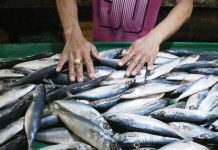MANILA – Senator Imee Marcos has sought to suppress the panic of local rice farmers over cheap imports that threaten to push down the buying price of palay even more when harvest time begins later this month.
Marcos said that local farmers have lost as much as 41.6 percent of their investments last month as the farmgate price of palay dropped to as low as P7 per kilo, compared to their average production cost of P12.
The neophyte senator added that a number of near-term solutions were available to the government to at least bring back the 17-peso support price of palay, like activating provisions in the six-month-old Rice Tariffication Law, tapping into existing support programs, and considering solutions adopted by other Asian countries.
“Let’s not exaggerate that the situation of our rice farmers is hopeless and that little can be done,” Marcos said in a statement.
She added that the government can provide more funding support for rice farmers by activating Section 7 of the Rice Tariffication Law, which will raise the current 35 percent tariff on rice imports from Thailand and Vietnam.
The higher 180 percent tariff on rice imports from non-ASEAN countries can also stand a further increase, so that the government can earn more revenue intended for rice farmer support, she added.
“If South Korea and Japan have imposed import tariffs of 500 percent to 800 percent to protect their local farmers, why can’t we?” Marcos asked. “Singapore prevents rice traders from manipulating prices by cornering 25 percent of private rice imports when smuggling is detected, buying them at cost with a 5 percent margin.”
Marcos also said that the Department of Agriculture has a calamity measure “Quick Response Fund” that can be tapped to buy palay from local farmers and triple the government’s “currently inadequate” rice buffer stock good only for 30 days.
The Pantawid Pamilyang Pilipino Program recipients can also receive rice subsidies instead of cash, with rice bought from local farmers using the P28 billion that the social welfare program provides.
Marcos also noted that the Philippines can also include rice in a “special products list” according to World Trade Organization rules, which allows more flexible trade arrangements when livelihood security is at risk.
“We can save our rice farmers if we could just be thorough in our tasks, work hard, and get things done ASAP,” Marcos said.
Opposition senator Francis “Kiko” Pangilinan, for his part, has urged the government to act as equalizer and implement the Sagip Saka Law immediately.
“Lahat ng accredited farmers organizations o kaya fisher-folk organizations ay pupuwedeng maging bahagi ng ganitong negotiated purchases sa mga pamahalaang lokal at pamahalaang pambansa. So for example ang gumagawa ngayon niyan, NFA (National Food Authority), bumibili direkta sa mga magsasaka. So ngayon hindi na lang NFA ang pwedeng bumili ng produktong bigas,” said Pangilinan.
According to him, the law exempts local governments and national agencies from the Procurement Law and can now directly buy from farmers’ and fishers’ organizations for their feeding program, their employees’ rice allowance, their food-for-work programs, among others.
“Halimbawa, may rice allowance yung ibang mga local governments, usually niyan cash, e di bigyan mo ng 80 percent cash, 20 percent bigas mismo. Pero yung bente porsyentong na bigas na yun bibilhin mo ngayon sa mga magsasaka. So yan yung magiging dagdag na supporta para sa ating magsasaka na alam nila pag nagtatanim sila hindi sila babaratin dahil nandiyan ang pamahalaang lokal, pamahalaang pambansa, mga ahensya ng gobyerno na bibili sa negotiated price na hindi palugi,” he said.
Sagip Saka of 2019 or Republic Act 11321 aims to increase farmers’ and fisher folk’s incomes by requiring government agencies to purchase produce and harvest directly from farm enterprises. By doing this without the middlemen, food prices go down and food producers earn more.
The law is part of Pangilinan’s campaign promises in the 2016 national elections. It was signed into law April 17, 2019, and was made publicly available May 27.
Agriculture officials vowed to implement the law immediately, after lawmakers pointed out that they have had a 90-day allowance for rollout. Sagip Saka should have been implemented by August./PN



